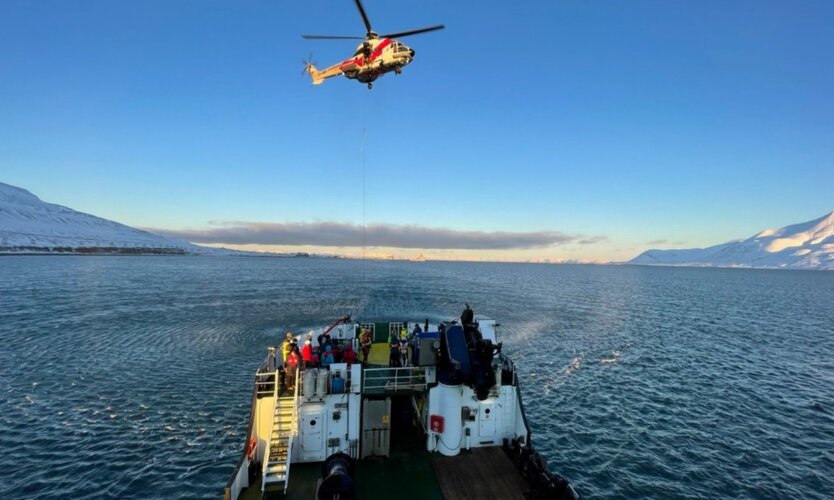
Copernical Team
SpaceX completes static fire test ahead of first private astronaut mission to ISS
 SpaceX on Wednesday completed a static fire test ahead of its launch of the first-ever private mission to the International Space Station, Axiom-1.
The mission, dubbed Axiom-1, will see a crew of four citizens strap into a Crew Dragon capsule and blast off on a 10-day flight where they will conduct a number of research investigation onboard the orbital outpost.
The launch, schedu
SpaceX on Wednesday completed a static fire test ahead of its launch of the first-ever private mission to the International Space Station, Axiom-1.
The mission, dubbed Axiom-1, will see a crew of four citizens strap into a Crew Dragon capsule and blast off on a 10-day flight where they will conduct a number of research investigation onboard the orbital outpost.
The launch, schedu SpinLaunch signs Space Act Agreement to test innovative mass accelerator launch system
 SpinLaunch has signed a Space Act Agreement with NASA. Through this partnership, SpinLaunch will develop, integrate, and fly a NASA payload on the company's Suborbital Accelerator Launch System to provide valuable information to NASA for potential future commercial launch opportunities.
The Space Act Agreement is part of NASA's Flight Opportunities Program, which demonstrates promising tec
SpinLaunch has signed a Space Act Agreement with NASA. Through this partnership, SpinLaunch will develop, integrate, and fly a NASA payload on the company's Suborbital Accelerator Launch System to provide valuable information to NASA for potential future commercial launch opportunities.
The Space Act Agreement is part of NASA's Flight Opportunities Program, which demonstrates promising tec Australia to build fleet of dual use Earth Observation satellites
 The Australian Government is establishing the nation's first national space mission. The 2022-23 Budget includes $1.16 billion to 2038-39 and $38.5 million per annum ongoing for the first phase of a National Space Mission for Earth Observation, which will see Australia design, build, and operate four new satellites.
Led by the Australian Space Agency, this Mission will make Australia more
The Australian Government is establishing the nation's first national space mission. The 2022-23 Budget includes $1.16 billion to 2038-39 and $38.5 million per annum ongoing for the first phase of a National Space Mission for Earth Observation, which will see Australia design, build, and operate four new satellites.
Led by the Australian Space Agency, this Mission will make Australia more The race to dominate satellite internet heats up
 Though satellite internet has existed for years, the competition is about to rapidly intensify, with companies planning to launch thousands of their own systems into low Earth orbit.
The latest move in the industry came on Tuesday from Amazon, which took a major step towards getting its $10 billion Kuiper constellation off the ground by sealing deals with three rocket companies.
The US o
Though satellite internet has existed for years, the competition is about to rapidly intensify, with companies planning to launch thousands of their own systems into low Earth orbit.
The latest move in the industry came on Tuesday from Amazon, which took a major step towards getting its $10 billion Kuiper constellation off the ground by sealing deals with three rocket companies.
The US o NASA to hold off retest of Artemis, clearing way for Axiom Space civilian launch

NASA will stand down for now in its attempt to complete a launch pad test of the massive Artemis moon rocket at Kennedy Space Center, which paves the way for the first all-civilian launch to the International Space Station on Friday.
After scrubs in the tanking and countdown simulation on both Sunday and Monday at KSC's Launch Pad 39-B, further attempts this week would have threatened the Axiom Space launch on a SpaceX Crew Dragon from nearby Launch Pad 39-A.
But NASA officials said a quick turnaround wasn't in the cards to work out the issues from the incomplete test.
"It looks like we'll take just about as much time as we're going to need for Axiom to fly, so we will fall in behind them," said Artemis mission manager Mike Sarafin. "We've got to finish sharpening the pencil on our open work but we don't anticipate it will be too much longer than after the Axiom launch."
The fully integrated Space Launch System rocket and Orion capsule faced different pressurization and valve issues both tied to the mobile launcher on which the rocket sits that halted tanking efforts both days.
Meet the 2021 ESA Champions

Passionate, original and talented: that’s what the 2021 ESA Champions look like. After reviewing thousands of profiles, the jury selected 15 space enthusiasts who showed particular passion for space in Europe and skills for communication. Read more about the awards and watch the video to meet the Champions!
406 Day: how Galileo helps save lives

Today is the annual 406 Day, celebrating the life-saving importance of emergency beacons, named for the radio frequency they operate on, as well as the satellites that relay their signals – with Europe’s own Galileo constellation prominent among them. While Galileo’s main purpose is satellite navigation, the system also picks up distress messages from across the globe and relays them to regional search and rescue authorities.
Beyond Gravity to develop dispenser for Project Kuiper's satellite constellation
 Fast, affordable broadband for people worldwide - this is the ambitious mission behind Project Kuiper, an Amazon initiative to increase global broadband access through a constellation of satellites in Low Earth Orbit (LEO). A
mazon will soon begin deploying its initial constellation of 3,236 satellites and has selected space technology provider Beyond Gravity (known as RUAG Space until the
Fast, affordable broadband for people worldwide - this is the ambitious mission behind Project Kuiper, an Amazon initiative to increase global broadband access through a constellation of satellites in Low Earth Orbit (LEO). A
mazon will soon begin deploying its initial constellation of 3,236 satellites and has selected space technology provider Beyond Gravity (known as RUAG Space until the Cosmic SETI ready to stream data for technosignature research from Jansky VLA
 COSMIC SETI (the Commensal Open-Source Multimode Interferometer Cluster Search for Extraterrestrial Intelligence) took a big step towards using the National Science Foundation's Karl G. Jansky Very Large Array (VLA) for 24/7 SETI observations. Fiber optic amplifiers and splitters are now installed for all 27 VLA antennas, giving COSMIC access to a complete and independent copy of the data stream
COSMIC SETI (the Commensal Open-Source Multimode Interferometer Cluster Search for Extraterrestrial Intelligence) took a big step towards using the National Science Foundation's Karl G. Jansky Very Large Array (VLA) for 24/7 SETI observations. Fiber optic amplifiers and splitters are now installed for all 27 VLA antennas, giving COSMIC access to a complete and independent copy of the data stream Planetary scientist helps equip rover Perseverance with 4 of the 5 human senses
 For two decades, Roger Wiens has built instruments to give humans eyes and a nose on Mars - and now he's helping add ears as well.
Wiens, a professor of Earth, Atmospheric, and Planetary Sciences in the College of Science at Purdue University, and an expert in Mars robotics technology, led the team that built SuperCam, a device on the Perseverance Mars rover that includes a laser for zappi
For two decades, Roger Wiens has built instruments to give humans eyes and a nose on Mars - and now he's helping add ears as well.
Wiens, a professor of Earth, Atmospheric, and Planetary Sciences in the College of Science at Purdue University, and an expert in Mars robotics technology, led the team that built SuperCam, a device on the Perseverance Mars rover that includes a laser for zappi 































